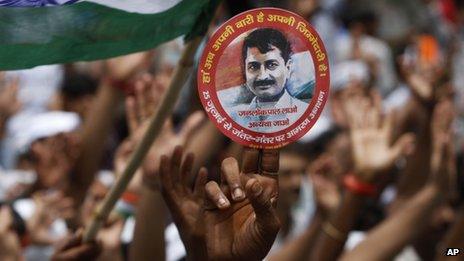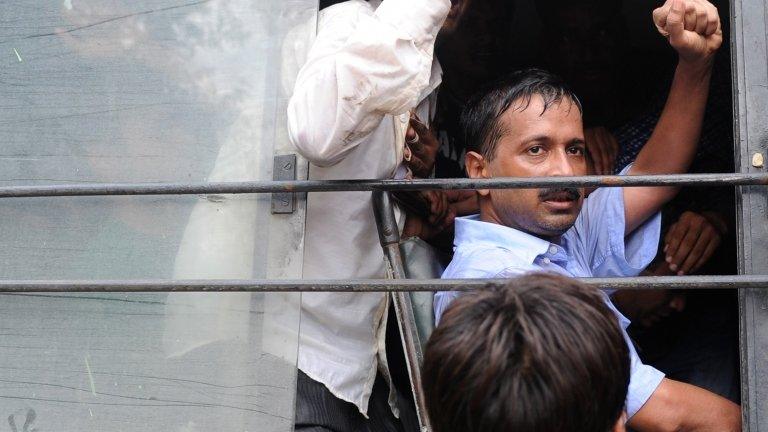Will India's new anti-corruption party work?
- Published
- comments

Mr Kejriwal's party promises to take on graft
Indian activist Arvind Kejriwal, external, who announced a new political party to fight corruption this week, promises to "change the system within a fortnight", external if voted into power.
Many say there is a touching naiveté about such a pledge in a country where the trust between the people and politicians has frayed. The more optimistic say Mr Kejriwal's sheer audacity of hope is commendable.
But coming on the back of a growing countrywide campaign against corruption, Mr Kejriwal's yet unnamed party may well touch a chord among people who have become increasingly fed up of graft and malfeasance found in some leaders and officials.
Mr Kejriwal, a former bureaucrat, is a doughty, spirited campaigner and a crafty strategist. His critics say he's inexperienced in the wily arts of politics, and too obdurate and humourless to succeed in India's fiercely competitive political world. Mr Kejriwal, they say, will also miss his mentor, the charismatic activist Anna Hazare, who has said he doesn't support this political foray.
Mr Kejriwal's party promises an independent and powerful ombudsman to punish graft (essential, though there are concerns that it could become a bloated, Kafkaesque anti-corruption bureaucracy), and sweeping electoral, police and judicial reforms (all of which India desperately needs, but reforms that politicians seem to be averse to), among other things.
There is a "code of conduct" for party members to avoid the "trap of moral risk that politics carries". Elected representatives will eschew traditional, feudal trappings of political power - cars with red beacons, heavy security and immense discretionary powers are only some of them.
Will Mr Kejriwal's party work?
Social movements - as the anti-graft movement is often described - and collective action have never really made the great leap into politics in India.
There have been movements for land rights and formation of states on the basis of language spoken by its people and against deforestation and commercial forestry in Himalayas and big dams. There have been movements which have pressured governments to enact legislation.
Mr Kejriwal's party has its roots in a laudable movement and its vision appears to be a mix of Gandhian and socialist principles. But it faces several challenges.
How would it compete with India's powerful, parochial regional parties? How does Mr Kejriwal's party position itself in what, according to a prominent social scientist, has become a "patronage democracy" where elections have been reduced to "auction for the sale of government services"?
How does it plan to remain neutral in a fractured politics where caste remains a diminished but an important variable? How does it avoid the trap of the personality cult, bane of most parties? How does it compete in the country's frenetic politics where alliance-building has become the key to electoral success? What about the long and tedious process of building a grassroots network of support far away from the glare of the TV cameras, which Mr Kejriwal has become used to?
But even if his party ends up as a credible pressure group within India's messy politics, it will be a considerable achievement.
- Published2 October 2012
